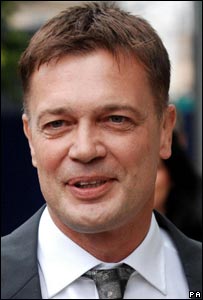
Dr Wakefield stands by his findings
|
The doctor who first linked the MMR vaccine to autism has defended the way he carried out his research and his motivation for doing so. Dr Andrew Wakefield said he adhered to official guidelines in his research, which led to the publication of the 1998 Lancet paper. He said he had wanted to help treat and prevent autism after being approached by worried parents. Dr Wakefield, and two colleagues, deny charges of professional misconduct. The 51-year-old, who is now working in the US, is accused of violating ethical guidelines, and of acting against the clinical interests of the children who took part in his trial. He is also accused of acting dishonestly in failing to disclose to the Lancet that he was advising solicitors acting for parents who had alleged their children had been damaged by MMR. But the GMC case is not examining the safety of MMR, designed to protect against measles, mumps and rubella.
Dr Wakefield said he was approached by a mother in 1995 who believed her child had regressed into autism after having the MMR jab and felt it was his duty as a "human being" to help her. The mother said her child also had terrible bowel problems, which she believed was linked to the autism. At the time Dr Wakefield had been looking at links between measles and bowel disorders, but thought the woman's concerns were worth exploring as it was well-known that there was a link between gut and brain problems. This woman then put him in touch with other parents in a similar position, he said. 'Wanted to help' Describing what parents told him about their children, Dr Wakefield said: "They were telling me what turned out to be remarkably consistent stories of a normal child who they had lost."
 |
CONFIRMED CASES OF MEASLES, MUMPS AND RUBELLA 1996-2007
2002 - Health experts blamed rise of measles cases on poor uptake of MMR vaccine
2005 - Mumps epidemic mainly affected 13-24 year-olds who were too old to have had MMR vaccine as children
|
He said, in a research capacity, he was fascinated that something might be done for the children. The GMC hearing was told that Dr Wakefield, along with colleagues, developed a hypothesis linking MMR and autism and decided to conduct clinical studies to establish the "validity" of it. Dr Wakefield said he wanted to do this "so we could help in treatment and prevention". He said at this time he was unaware that some parents were seeking to take legal action over the issue. "The parents contacting me was nothing to do with litigation, and litigation was not my primary concern." And when asked by his own QC, Kieran Coonan, whether he had followed Royal College of Physicians guidance on research practices, he replied: "We complied entirely consistently with this document." He added that decisions to carry out procedures such as magnetic resonance imaging (MRI) scans and invasive tests such as lumbar punctures and colonoscopies - which form a central part of GMC case - were made by one of his colleagues. Crisis in confidence If found guilty of serious professional misconduct, Dr Wakefield faces being struck off the medical register in the UK.
 |
 Litigation was not my primary concern Litigation was not my primary concern 
|
Also facing professional misconduct charges are Professor John Walker-Smith, and Professor Simon Murch. But the impact of the MMR research has already extended beyond this. Despite the scientific community repeatedly stressing that the vaccine is safe, there has still been a crisis in public confidence. The uptake of the triple jab slumped in the immediate aftermath of the study being published. And while it has shown signs of improving in recent years, it is still under the 95% needed in some places, particularly London. This has come at a time when the number of confirmed cases of measles has risen from 56 in 1998 in England and Wales to about 1,000 last year.
|
Bookmark with:
What are these?